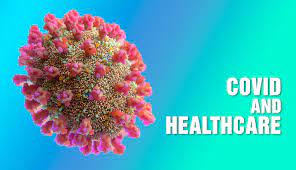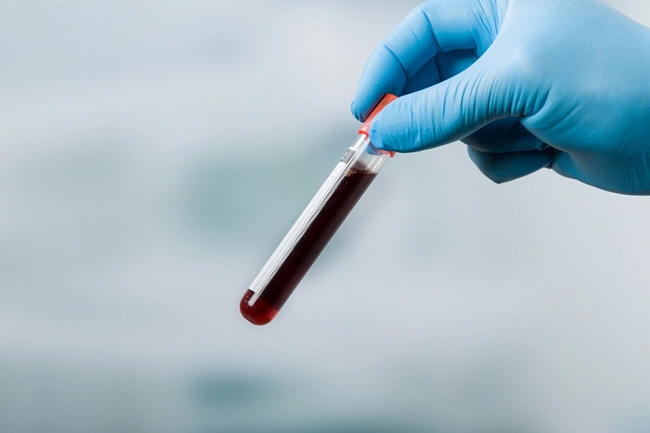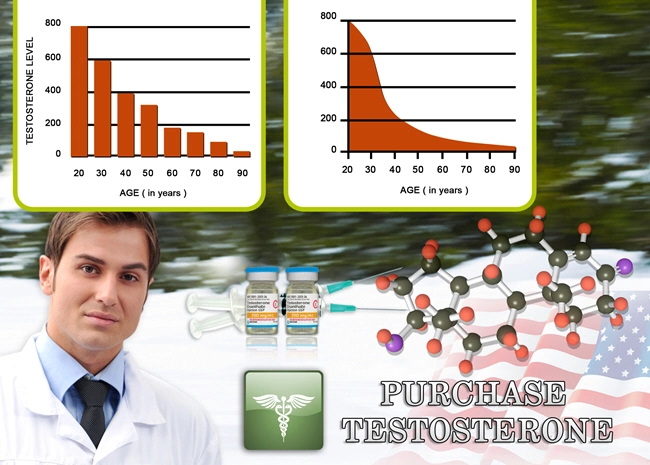
It’s a fact. Men’s testosterone levels are plummeting. Countless studies have found that men’s testosterone levels have been declining for decades.
A 2007 study that appeared in the Journal of Clinical Endocrinology and Metabolism concluded that there has been a “substantial drop” in men’s testosterone levels since the 1980s with the average levels diminishing by about 1% annually. What this means is that a 60-year-old man in 2004 had testosterone levels an  astonishing 17% lower than a 60-year-old man did in 1987.
astonishing 17% lower than a 60-year-old man did in 1987.
A similar study in Denmark uncovered comparable results. In that study, Danish men born in the 1960s had 14% lower testosterone than Danish men born in the 1920s.
Perhaps the most depressing aspect of these studies is the blistering pace at which these declines are occurring. 20 to 40 years is a micro-second in the overall scheme of things, and the consequences of this vanishing of the “manly hormone” are alarming, and have severe consequences, both to the individual men suffering from lower testosterone (“Low-T”) and society at large.
From fighting and winning wars, and constructing engineering marvels, to being a loving husband and father, testosterone plays a crucial and perhaps irreplaceable role in the development and maintenance of civilization.
To word it another way, it is no coincidence that in this era of disappearing testosterone we are hearing the question “Where are all the good men?” being asked with increasing frequency.
What is behind these sinking testosterone levels?
A good question. Regrettably, there is no one answer. Let’s take a look at a few of them.
- Obesity. Being fat and overweight lowers testosterone. This is mainly due to insulin resistance-associated reductions in sex hormone-binding globulin. Another possible link of obesity to Low-T is that overweight folks often make poor food choices that result in more obesity and more pounds make it more challenging to get off the couch and get moving...a vicious cycle. This is a severe problem since according to the Center for Disease Control (CDC) obesity rates have ballooned from 30.5% from 1999-to 2000 to 41.9% from 2017 to March of 2020.
- Environmental toxins. Men’s testosterone is under continued assault from a constant barrage of chemical toxins and pollutants. In the past several decades our environment has changed radically, and these changes wreak havoc on our hormones, especially testosterone. Nasty toxins like BPA, Phthalates, and Parabens are seemingly everywhere: in plastics, fast foods, food additives, shampoos, shaving gel, toothpaste, sunscreen – the list of stealth testosterone bandits continues to grow with no end in sight.
- Technology. Numerous studies have concluded that watching hours and hours of television contribute to obesity. This is due to the “couch potato syndrome” of not exercising, pigging out on junk foods, and a diminished resting metabolism. And this was before the appearance of electronic devices like cell phones, computers, and video games. These gadgets have become omnipresent in our daily lives, and dramatically reduced our time for physical fitness with predictable results like the obesity epidemic and ebbing testosterone.
- Occupations. In times past, many jobs for men required a degree of manual labor and strength. But in today’s modern economy there has been a shift to more men working in occupations that do not require the same degree of physicality that their fathers and grandfathers needed.
- Culture. Traditional masculinity is under attack in today’s cultural environment. Values that were once both expected from males and also respected (provide, protect, stoicism, risk-taking, aggression, courage, independence, assertiveness, and leadership) now often fall under the category of “Toxic
 masculinity.” The American Psychological Association released an article titled “psychological practice guidelines for boys and men” that turned these values upside down. Traits that were once considered the foundations of civilizations were now mentioned in articles with titles like The culture of masculinity and its negative impacts on men, and have resulted in mass confusion for men of all ages, especially boys and young men. Exactly how much of a role this cultural shift has played in the drop of testosterone is unknown. But few disagree with the fact that it has had an influence.
masculinity.” The American Psychological Association released an article titled “psychological practice guidelines for boys and men” that turned these values upside down. Traits that were once considered the foundations of civilizations were now mentioned in articles with titles like The culture of masculinity and its negative impacts on men, and have resulted in mass confusion for men of all ages, especially boys and young men. Exactly how much of a role this cultural shift has played in the drop of testosterone is unknown. But few disagree with the fact that it has had an influence. - Substance abuse. Men’s rate of substance abuse has been spiraling upward, and these self-destructive addictions to alcohol and street drugs also pile on to the tumbling level of testosterone.
- Prescription medications. As with substance abuse, overly medicated men suffer from watching their testosterone say goodbye.
- Lack of sleep. A lack of sleep is not restricted to men. According to the Center for Disease Control and Prevention, more than 35% of Americans get less than 7 hours of sleep each night. Once again, testosterone is affected since testosterone is released during sleep. This is just one more participant in this parade of calamities that chip away at testosterone.
This is not a comprehensive list. The point is that there are several factors involved in this testosterone collapse.
Why this loss of testosterone is a looming health crisis
Think about the image of an elderly person. A stereotypical example is a man stooped over, shuffling slowly with a cane, somewhat confused, wrinkled, dry skin, breathing heavily after the slightest exertion, and talking incessantly about his medical issues, and his aches and pains.
TRT when used correctly is capable of slowing down, stopping, and at times even reversing these debilitating symptoms of aging. Here are just a few of the many benefits that TRT can restore:
- Skyrocket your energy levels
- Reduce stress
- Strengthen your heart
- Blowtorch ugly, unhealthy fat
- Improve your health and quality of life
- Stop insomnia and allow you to get to sleep and stay asleep
- Improved self-confidence and an optimistic outlook
- Make your libido come roaring back to life
- Develop laser-like mental focus
- Boost your immune system
- Increase your bone density
- Lower blood pressure
- Ramp up your metabolism
And that’s not all that testosterone does. Take a glance at these next two studies and see more crucial roles that testosterone plays in improving all aspects of your life.
Study finds that high testosterone levels may help men land, and retain jobs
A recent study determined that unemployed men with medium to high testosterone levels were more likely than those with low testosterone to have found work after being in the ranks of the unemployed for more than five months.
For men, career performance may depend on more than their expertise in the field.
Testosterone — the reproductive hormone found in greater concentrations among men — is a possible hidden factor in job retention and success among men,  according to a new study published in the journal Economics and Human Biology.
according to a new study published in the journal Economics and Human Biology.
A UK health survey of more than 2,200 men aged between 25 and 64 showed that higher levels of testosterone in men had less risk of being laid off and shorter periods of unemployment compared to men with less testosterone.
Researchers found that unemployed men with medium to high testosterone levels were more likely than those with low testosterone to be back on the job after five months.
“Our results suggest that British men with higher testosterone levels are less likely to become unemployed, and they are less likely to remain in unemployment if they are out of work,” said study author Peter Eibich, deputy head of the Research Group on Labor Demography at the Max Planck Institute for Demographic Research.
“This is likely due to differences in personality traits and behavior caused by testosterone. For example, we find that men with higher testosterone levels are more confident and reported that they were more likely to use the internet for their job search.”
The economic researcher stated his team had been “interested in how biological markers (such as testosterone levels) relate to social and economic outcomes.”
The potential “consequences” of having high or low testosterone levels are unclear, according to Eibich, but researchers wondered whether hormone activity manifests in areas other than physical health. Such “biomarkers” are routinely collected among biodata surveys, though scant research has been undertaken to determine whether biological processes, such as hormone activity, are linked to social and economic behavior.
“Testosterone is a particularly interesting case — previous research shows quite clearly that testosterone levels are related to certain personality traits (e.g., risk aversion) and individual behavior (e.g., status-seeking and dominant behavior). Such personality traits and behavior have been previously linked to an individual’s success in the labor market,” explained Eibich in a statement on Monday.
A study finds that men with low testosterone are at greater risk of dying from coronavirus
Men suffering from lower levels of testosterone (“Low-T”) are at a higher risk to die from the coronavirus, according to an ominous recent German study. Researchers at the University Medical Center Hamburg-Eppendorf studied the first 45 COVID-19 patients — 35 men and 10 women — who were admitted to its intensive care unit.
Nine men and three women from the group died. Meanwhile, seven patients required oxygen and 33 required the use of ventilators, according to the report.
Of the 35 men, more than two-thirds — about 69 percent — had low levels of the “manly hormone”, which helps control the body’s immune response, while 60 percent of the women had elevated testosterone levels.
Without an adequate supply of the hormone, the body can’t regulate its immune response, which could lead to a deadly “cytokine storm,” which occurs when the immune system is disrupted as it tries to kill the pathogen. Low levels of the hormone can’t control the immune response in men, but the study found that among female patients, higher levels were linked to a higher inflammatory response.
“Men with normal testosterone levels do not present a cytokine storm and thus are more likely to survive,” Professor Gülsah Gabriel from the Leibniz Institute for Experimental Virology in Hamburg, who was involved in the research. “Thus, low testosterone levels in men seem to be a risk factor for severe and even fatal disease outcome in men upon infection with so-called ‘cytokine inducing’ respiratory viruses,” he said.
Experimental Virology in Hamburg, who was involved in the research. “Thus, low testosterone levels in men seem to be a risk factor for severe and even fatal disease outcome in men upon infection with so-called ‘cytokine inducing’ respiratory viruses,” he said.
Ali Daneshkhah, a research fellow at Northwestern University who was not involved in the study, told the news outlet: “This is what seems to kill a majority of COVID-19 patients, not the destruction of the lungs by the virus itself. It is the complications from the misdirected fire from the immune system.”
Some men are born with hypogonadism, the affliction in which the body doesn’t produce enough testosterone, while others develop it later in life, usually from infection or injury, according to the Science Times. Some types of the condition may be treated with testosterone replacement therapy.
“With SARS-CoV-2 continuing to infect humans worldwide, it was repeatedly reported that men with COVID-19 are at higher risk to develop severe and even lethal outcomes compared to women, independent of age,” the scientists behind the research wrote. “Thus, it has become of utmost importance to understand why men are more likely to die from Covid-19 than women,” they added.
The study has not yet been peer-reviewed.
So there you have it. Hopefully, you can see just how critical testosterone is for maintaining optimal health. Our clinic is staffed with the finest professionals in the field of testosterone replacement.
 We stay abreast of all recent developments and we are ready, willing, and able to provide you with the most efficient, cost-effective, and safe methods of restoring your testosterone to its youthful levels.
We stay abreast of all recent developments and we are ready, willing, and able to provide you with the most efficient, cost-effective, and safe methods of restoring your testosterone to its youthful levels.
But we don’t stop there
In addition to our hormone replacement treatment regimens, we give detailed advice on nutrition, hydration, supplements, physical fitness, sleep, toxin removal and avoidance, and controlling stress. Rest assured, we do not provide routines and plans that are indistinguishable. We tailor-make our approach for you, and only you!
Contact us for a FREE, no-obligation discussion concerning the remarkable benefits of Testosterone Replacement Therapy (TRT).
Contact Us Today For A Free Consultation
Dear Patient,
Once you have completing the above contact form, for security purposes and confirmation, please confirm your information by calling us.
Please call now: 1-800-380-5339.
Welcoming You To Our Clinic, Professor Tom Henderson.

- LabCorp Announces a Change to the Testosterone Reference Range [Last Updated On: April 16th, 2025] [Originally Added On: June 23rd, 2019]
- Important Facts About Testosterone Therapy Before Buying [Last Updated On: April 18th, 2025] [Originally Added On: July 13th, 2019]
- Soy: Does it Lower Testosterone? [Last Updated On: October 18th, 2024] [Originally Added On: August 30th, 2020]
- Testosterone Treatments May Successfully Reverse Type-2 Diabetes in Some Men [Last Updated On: April 15th, 2025] [Originally Added On: November 13th, 2020]
- Testosterone Replacement Therapy (TRT) May Prevent Heart Attacks and Diabetes [Last Updated On: April 21st, 2025] [Originally Added On: November 17th, 2020]
- Did You Know? Recent Studies Have Confirmed the Link Between Low Testosterone (“Low-T”) and Depression. [Last Updated On: April 17th, 2025] [Originally Added On: January 10th, 2021]
- New Study Finds Testosterone Does Not Increase Your Heart Attack Risk [Last Updated On: April 14th, 2025] [Originally Added On: January 11th, 2021]
- The Great Testosterone Debate [Last Updated On: April 20th, 2025] [Originally Added On: January 14th, 2021]
- Testosterone Replacement Therapy Lowers Heart Attack Risk [Last Updated On: April 19th, 2025] [Originally Added On: January 18th, 2021]
- New Study Says: The Benefits of Testosterone Replacement Therapy Outweigh The Risks [Last Updated On: April 22nd, 2025] [Originally Added On: January 19th, 2021]
- Male Menopause. Fact or Fiction ? [Last Updated On: April 23rd, 2025] [Originally Added On: January 20th, 2021]
- Testosterone: How Much Do You Really Know About This Masculine Hormone? [Last Updated On: October 6th, 2024] [Originally Added On: February 9th, 2021]
- Low-T: What are healthy levels of Testosterone and why is it difficult to measure? [Last Updated On: September 11th, 2025] [Originally Added On: April 3rd, 2021]
- Testosterone Therapy May Be Good for the Heart if You Have Low-T [Last Updated On: May 3rd, 2025] [Originally Added On: July 21st, 2021]
- A Recent Study Concludes: Testosterone DOES NOT Cause Prostate Cancer [Last Updated On: September 14th, 2025] [Originally Added On: August 16th, 2021]
- In the Battle Against Aging, When do the Risks Outweigh the Rewards? [Last Updated On: April 4th, 2025] [Originally Added On: August 18th, 2021]
- New Study Concludes: Boosting Testosterone Levels Lowers Men's Death Risk [Last Updated On: May 11th, 2025] [Originally Added On: August 20th, 2021]
- Testosterone Replacement Therapy Slows Prostate Cancer! [Last Updated On: April 2nd, 2025] [Originally Added On: September 13th, 2021]
- Research proves that Testosterone Therapy Boosts Fertility! [Last Updated On: April 5th, 2025] [Originally Added On: September 26th, 2021]
- Free Testosterone and Sex Hormone-Binding Globulin [Last Updated On: April 6th, 2025] [Originally Added On: October 15th, 2021]
- Testosterone Does Not Cause Heart Attacks [Last Updated On: April 7th, 2025] [Originally Added On: October 15th, 2021]
- Testosterone and Women [Last Updated On: April 8th, 2025] [Originally Added On: October 15th, 2021]
- Testosterone and Metabolic Syndrome [Last Updated On: April 3rd, 2025] [Originally Added On: October 15th, 2021]
- Testosterone and Disease Prevention [Last Updated On: March 31st, 2025] [Originally Added On: October 15th, 2021]
- Judge Vacates $140 Million Verdict in Testosterone Lawsuit [Last Updated On: April 1st, 2025] [Originally Added On: October 15th, 2021]
- Testosterone and Estrogen [Last Updated On: April 9th, 2025] [Originally Added On: October 16th, 2021]
- Testosterone and Aging [Last Updated On: April 10th, 2025] [Originally Added On: October 16th, 2021]
- Testosterone Replacement Therapy (TRT) Benefits [Last Updated On: April 11th, 2025] [Originally Added On: October 16th, 2021]
- Testosterone and Male Menopause [Last Updated On: March 30th, 2025] [Originally Added On: October 16th, 2021]
- Testosterone Battles Obesity [Last Updated On: March 29th, 2025] [Originally Added On: October 16th, 2021]
- Why You Need Testosterone Replacement Therapy [Last Updated On: May 14th, 2025] [Originally Added On: October 16th, 2021]
- Testosterone FAQ's [Last Updated On: May 13th, 2025] [Originally Added On: October 25th, 2021]
- How Testosterone Impacts Sexual Preferences In Men and Women [Last Updated On: March 28th, 2025] [Originally Added On: October 30th, 2021]
- Growth Hormone and The Thyroid Gland [Last Updated On: April 24th, 2025] [Originally Added On: November 19th, 2021]
- How Does Masturbation Affect Testosterone Levels? Exploring the Science [Last Updated On: May 24th, 2025] [Originally Added On: March 27th, 2022]
- Testosterone Therapy Increasingly Used to Help Men Take Control of Aging [Last Updated On: May 25th, 2025] [Originally Added On: May 30th, 2022]
- Tlando Testosterone - A Brand New Way to Treat Low-T Safely with a Testosterone Pill [Last Updated On: May 28th, 2025] [Originally Added On: July 12th, 2022]
- Safe Tlando Testosterone Changes Landscape of Low-T Therapy [Last Updated On: May 30th, 2025] [Originally Added On: August 15th, 2022]
- Systems to Monitor Testosterone Replacement Therapy (TRT) [Last Updated On: October 12th, 2025] [Originally Added On: September 21st, 2022]
- Testosterone May Help You Keep Your Job (Or Find Another) [Last Updated On: June 12th, 2025] [Originally Added On: October 4th, 2022]
- Toxic Chemicals are Killing your testosterone…And your Manhood! [Last Updated On: October 28th, 2024] [Originally Added On: October 10th, 2022]
- A new study reveals that Testosterone improves body composition in men with low testosterone! [Last Updated On: October 22nd, 2025] [Originally Added On: October 17th, 2022]
- A former Mr. Olympia speaks about testosterone [Last Updated On: October 10th, 2025] [Originally Added On: November 8th, 2022]
- Testosterone Blockers Thwart Melanoma [Last Updated On: June 9th, 2025] [Originally Added On: December 11th, 2022]








